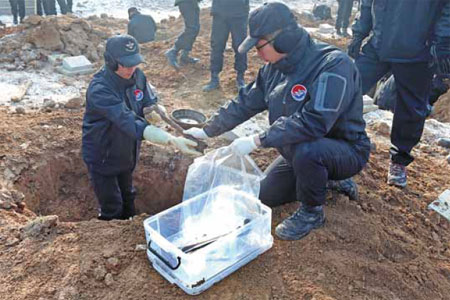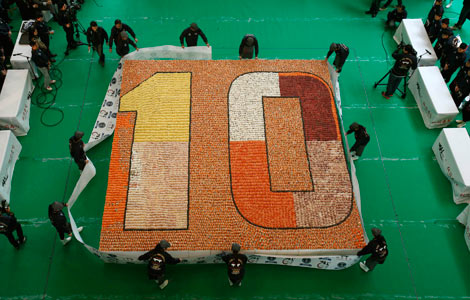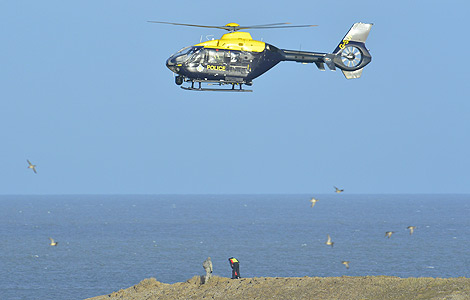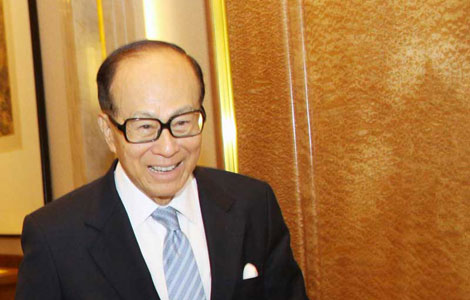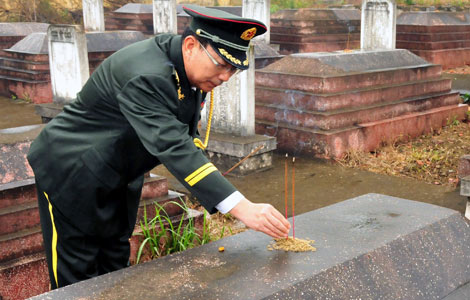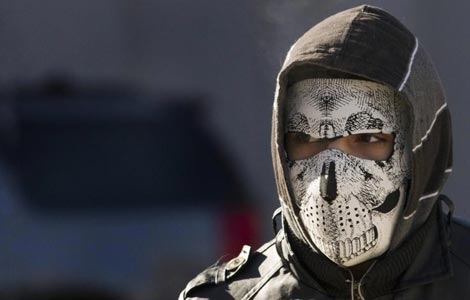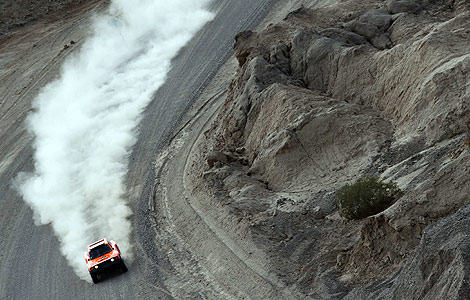April homecoming for war heroes
Updated: 2014-01-09 07:21
By Zhou Wa in Beijing and Yao Qilin from Xinhua in Seoul (China Daily USA)
|
||||||||

ROK completes gathering remains of volunteer force killed in Korean War
The exhumed remains of 425 Chinese People's Volunteers killed during the Korean War are expected to arrive home before Tomb Sweeping Day in April, a spokesman for the Republic of Korea's Defense Ministry said in a written response to questions from Xinhua News Agency.
The excavation has been completed and the remains will be cleaned and dried before being placed in coffins. The ROK will then sort the remains and identify them precisely before placing them back in their coffins, according to the statement.
Time is needed to authenticate various relics, such as pens, uniforms, stamps and badges, the statement said.
The ROK began to exhume the soldiers' remains in December after officials representing both China and the ROK agreed to repatriate the dead.
Most of the CPV remains - 367 bodies - had been buried at a cemetery in Paju, just south of the demilitarized zone separating the ROK from the Democratic People's Republic of Korea; 58 additional bodies were exhumed at various other burial sites in the ROK.
During a visit to China in June, ROK President Park Geun-hye offered to repatriate the remains in commemoration of the 60th anniversary of the signing of the armistice ending the Korean War (1950-53).
The CPV entered the war in 1950 to help the DPRK resist US-led United Nations troops. Tens of thousands of CPV soldiers died.
"We have always honored the CPV soldiers who sacrificed their lives for the cause of peace and freedom. Their names will be remembered in history forever," said Geng Yansheng, spokesman for the Chinese Ministry of National Defense.
'Fallen leaves return'
The decision to return the remains is "very good", said 81-year old Yang Zhichun, one of the CPV soldiers who fought in the war in 1951.
"Just like fallen leaves return to the roots, they should be sent back to their home."
Seoul will retain the cemetery in Paju so that additional CPV remains, if found, can be interred there as needed in the future before being repatriated. As of today, the 425 are all that have been found.
According to the ROK defense ministry, the Paju cemetery also includes 735 DPRK bodies. The cemetery is designated for "enemy forces".
The burial site is on a quiet hill just south of the heavily armed boundary that divides Korean neighbors on the peninsula.
The Chinese CPV dead had been buried in various small plots scattered around the country until 1996 when the ROK government established the cemetery in Paju as a final resting place.
Most of the graves were marked "Anonymous" in Korean - written in dark ink and identified only by nationality.
"The graves are pointed to the north. They are facing home," said ROK First Lieutenant Choi Won-joon, who served as a military guide at the cemetery.
The site was once poorly tended and fell into disrepair until nongovernmental organizations called for better treatment of the dead. They promoted the cemetery as a bridge for improved ties between the ROK, China and the DPRK.
The ROK government spent 500 million won ($450,000) in 2012 to renovate the site.
Visiting the burial grounds on the Korean Peninsula is the dream of thousands of former CPV soldiers and their family members.
In June, the Korea China Cultural Association invited three former CPV soldiers from Yibin, Sichuan province, to visit the graves in Paju. Five former ROK soldiers who participated in the war came to the cemetery to receive them.
"We fought to kill or to be killed at the front 60 years ago, but we are delighted to meet peacefully like this in our old age. Let us now bury the past and live together in peace," said an elderly man from the ROK.
Chen Ruobi, an 81-year-old woman who joined the war as a CPV soldier, wept. She said it was good to see her fellow soldiers laid to rest in a wonderful place, even though it was in a faraway land.
Lee Young-il, president of the Korea China Cultural Association, expressed his feelings:
"The most important lesson we can get here is that war cannot and should not be a means for unification. It was war that once again confirmed that all international conflicts should be resolved peacefully."
Contact the writer at zhouwa@chinadaily.com.cn
|
Workers from the Republic of Korea dig up the remains of Chinese volunteer soldiers killed in the Korean War (1950-53) in Paju on Dec 20. The Chinese People's Volunteers fought in the war trying to help the people of the Democratic People's Republic of Korea resist the United States' aggression. Tens of thousands of CPV soldiers died on the Korean Peninsula during the war. Provided to China Daily |
(China Daily USA 01/09/2014 page6)
Most Viewed
Editor's Picks

|
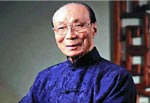
|

|

|

|

|
Today's Top News
Students challenged on China knowledge
Chicago lures Chinese tourists
Delta authorities pledge to battle smog together
US troop deployment stoking peninsula tensions
Abe blasted at UN
Dirty air? Why not wash it?
The changing face of Chinese ODI in US
China imports more US-built cars
US Weekly

|

|
